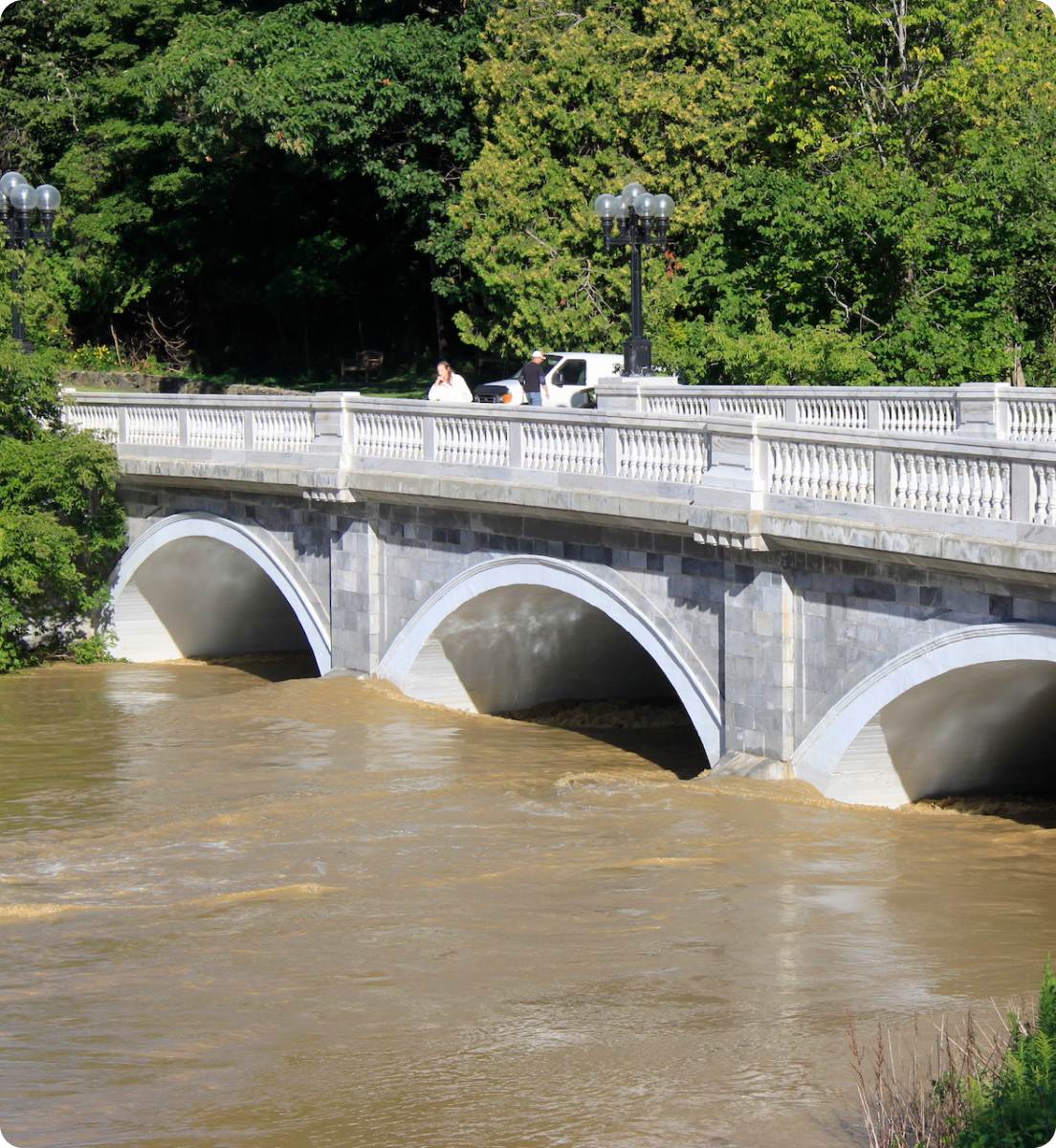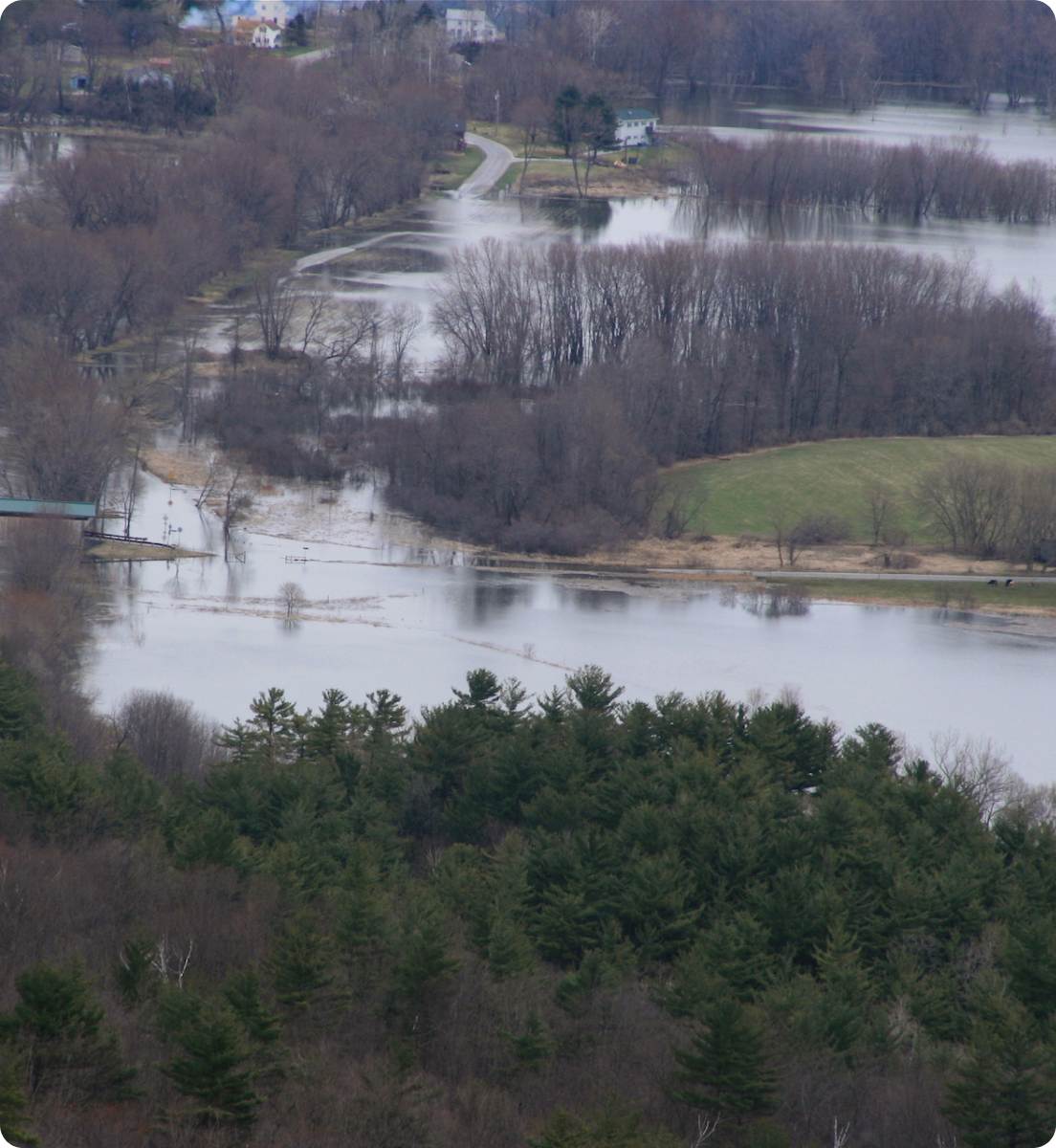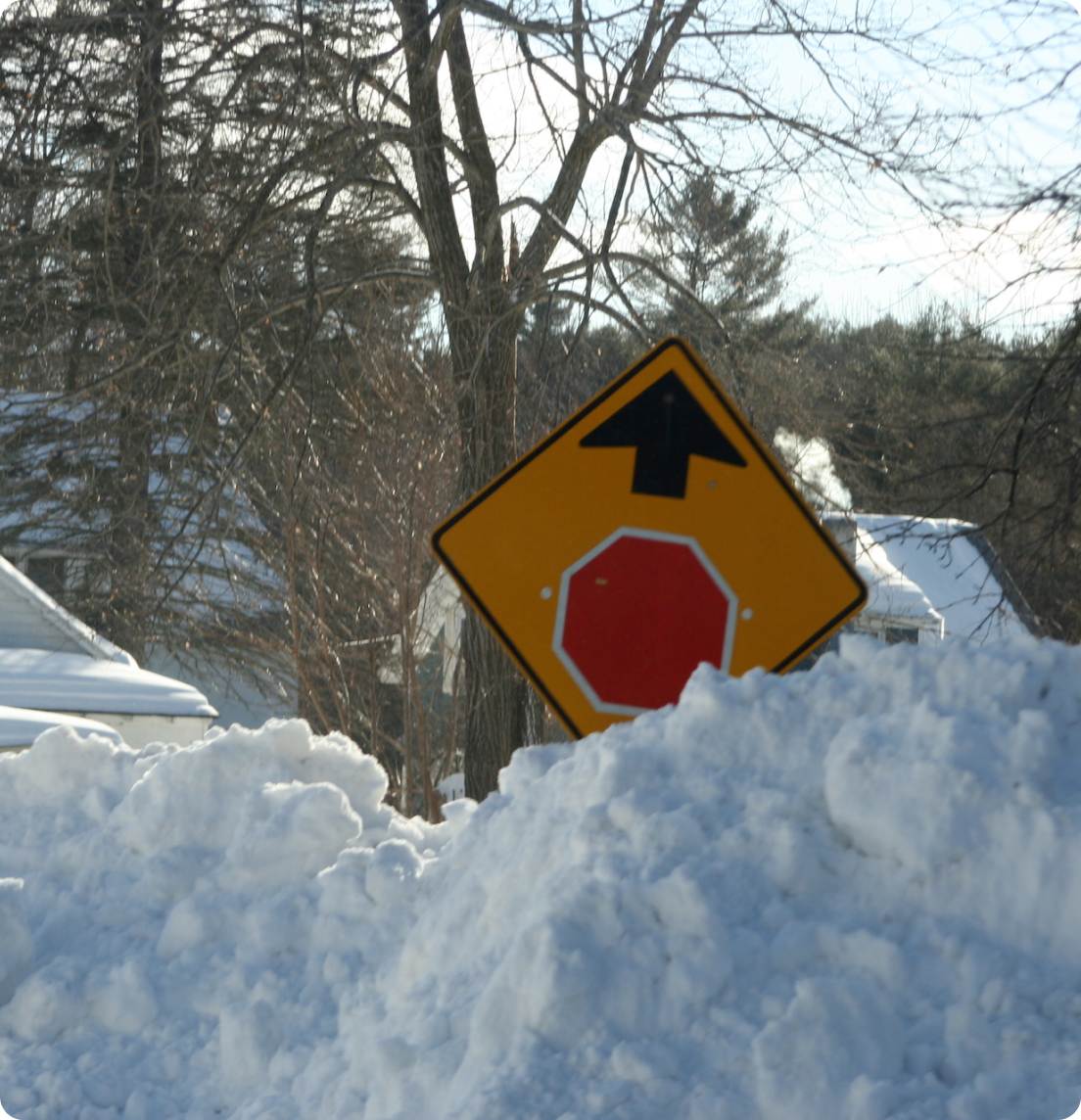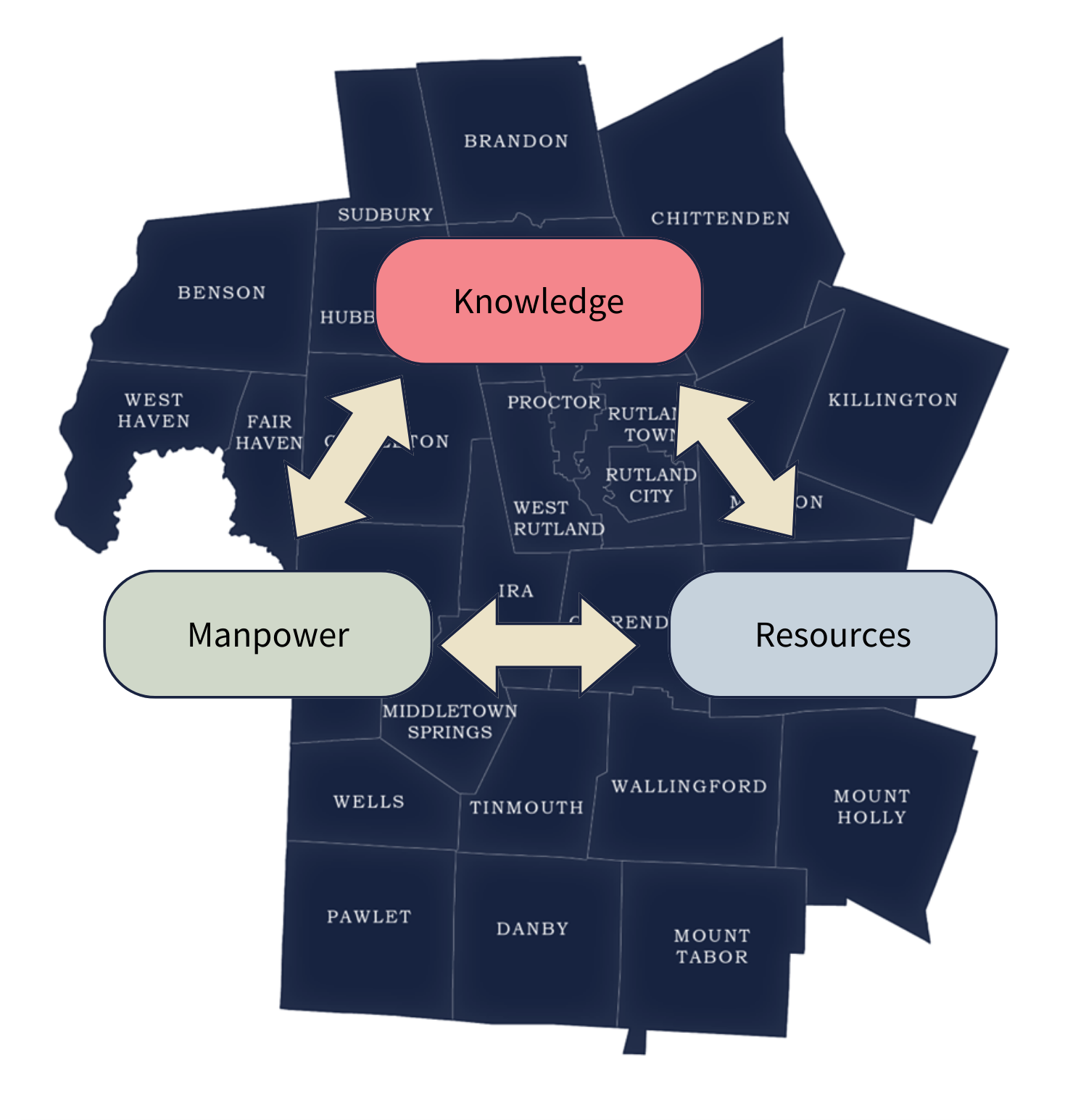
Emergency Management
The difference between an emergency and an inconvenience is the level of preparation. Many incidents are spontaneous and unpredictable, occurring with little to no warning. Others may offer a small window of time thanks to advanced prediction models. In all cases, Emergency Management planning improves the outcome of natural, technological, or human-caused disasters by engaging local communities in preparedness, response, recovery, and mitigation activities.
Contact Our team for personal assistance

Program Details
The Rutland Regional Planning Commission’s (RRPC) emergency management planning primarily focuses on preparedness and hazard mitigation.
Ongoing Learning and Training
The RRPC works with emergency management directors, emergency services personnel, social service agencies, and others in regional communities to identify vulnerabilities and prioritize actions that eliminate or lessen risk. This includes providing training opportunities and in-person platform discussions used to share information, experiences, and lessons learned.
The RRPC also assists municipalities in preparing and practicing their emergency plans. Above all, the RRPC is a resource serving communities “where they are at” to help strengthen resiliency throughout the region.

Updated Annually
The Rutland Regional Planning Commission is the resource for developing annexes for LEMPs.
VERMONT STATUTE dictates that every municipality review, improve, and adopt their LEMP’s between Town Meeting Day (the first Tuesday of March) and June 1st.
Local Emergency Management Plan (LEMP) – Annex Development
- Plans that include annexes or incident-specific emergency response plans and cater to the unique needs and capabilities of each municipality.
- The Rutland Regional Planning Commission hosts periodic workshops to help municipalities begin to develop LEMP annexes that address the needs of their individual communities.
- One-on-one support is also available simply by reaching out to the RRPC Planner.
Local Emergency Management Plan (LEMP) – Updates
- Municipalities looking for support with annual LEMP updates can contact the Vermont Emergency Management Coordinator.
- The 2025-2026 Rutland Region Coordinator is: William Jones [email protected]

Hazard Mitigation Strategy
Hazard mitigation planning is our bread and butter.
The Rutland Regional Planning Commission (RRPC) has a proven track record of assisting municipalities in the region with a wide range of emergency management planning including Local Hazard Mitigation Plan (LHMP) updates. Copies of adopted municipal LHMPs can be found (on this website) at the bottom of each Community Page.
Over the years the RRPC has partnered with all twenty-seven (27) municipalities in the Rutland Planning Region to complete LHMPs. We are proud to report, with assistance from the RRPC, the City of Rutland successfully adopted their first single jurisdiction Local Hazard Mitigation Plan in 2025!
FEMA-approved LHMPs are accomplished by:
- assembling a well-informed planning team.
- conducting risk assessments and outlining vulnerability to key community assets.
- developing a comprehensive and action-orientated strategy to minimize harm.
* Throughout the process, RRPC supports municipalities in facilitating community outreach, collecting public comments and feedback from subject matter experts, and incorporating input into the plan.

Improving Regional Preparedness
The RRPC is working with local partners to build emergency management capacity with the development of a region-wide support network.
The purpose of the Rutland Regional Emergency Management Committee is to coordinate emergency planning and preparedness activities to improve the region’s ability to prepare for, respond to, and recover from all disasters. The REMC has over fifty (50) voting members and many more non-voting members including representation from: regional fire and police departments, hospitals, medical and rescue services and schools, to name a few.
COMMITTEE MEETINGS (warnings and minutes)
- Committee meetings are held in the months of December, March, June and September – typically in a hybrid format – and are always open to the public.
PARTNERSHIPS
Recognizing the challenges of municipal capacity, the RRPC is actively facilitating a nexus between the Rutland Regional Emergency Management Committee (REMC) and the Rutland Regional Disaster Cooperative. The Rutland Regional Disaster Cooperative is a county-wide organization seeking to coordinate emergency management knowledge and resources among local municipalities before, during, and following a disaster. The relationship between the REMC and the Rutland Regional Disaster Cooperative has developed over the past few years and continues to unfold.
GET INVOLVED!
People and Businesses interested in getting involved and learning more about the vital work being done in our region are urged to attend a REMC meeting.

Your Local Liaison in a Disaster!
RRPC plays a role in response and recovery during larger-scale events.
INCIDENT ACTIVATION
The Rutland Regional Planning Commission’s Emergency Management Planner serves as a “Local Liaison” between municipalities and the State of Vermont during larger-scale events. Upon activation from Vermont Emergency Management, staff* from the Rutland Regional Planning Commission are dispatched to collect situation updates related to shelter openings, emergency operation centers, and life safety. This information is combined with data from other local sources, including impacts to roads, public infrastructure, homes and businesses. Together this common operating picture becomes key in determining if the region is eligible for assistance funding through a Federal Disaster Declaration.
THE EMERGENCY MANAGMENT TEAM – Major Incidents
*A Team of RRPC staff complete annual Emergency Training enabling them to assist the Emergency Management Planner in conducting secondary telephone outreach to municipalities during major (in the scale of Tropical Storm Irene or the “Great Floods of 2023”) incidents.

Information at your fingertips
The RRPC has the most accurate and up-to-date information to save you time, effort, and money in all your local planning endeavors.
Rutland Regional Emergency Management Committee
RESOURCE DOCUMENTS
- 2025 Public Works Mutual Aid Agreement
- 2025 Vulnerable Populations Communications Protocol
- 2025 Rutland REMC Regional Plan
HELPFUL LINKS:
- Sign-up for VT-ALERT
- Connect Vermonters to services and resources
- Promote the Citizens Assistance Registry for Emergencies (CARES)
- Subscribe: VEM newsletters, training & funding notices
- EMD Resource Page
- EMD Public Contacts Page
- Funding Opportunities and Grants
- All Programs and Resources
- FEMA Home Page
